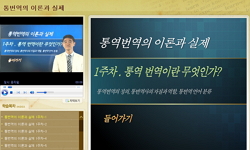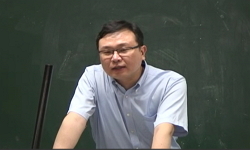The purpose of this study is to examine the trilateral relationship between the late Ch'ing period's Hsueh-Chan(學戰), translation and ideological enlightenment in connection with Ma, chun-wu(馬君武,)'s translation tzu-yu-yuan-li(『自由原理...
http://chineseinput.net/에서 pinyin(병음)방식으로 중국어를 변환할 수 있습니다.
변환된 중국어를 복사하여 사용하시면 됩니다.
- 中文 을 입력하시려면 zhongwen을 입력하시고 space를누르시면됩니다.
- 北京 을 입력하시려면 beijing을 입력하시고 space를 누르시면 됩니다.
https://www.riss.kr/link?id=A76161808
- 저자
- 발행기관
- 학술지명
- 권호사항
-
발행연도
2007
-
작성언어
Korean
-
주제어
청말 ; 학전 ; 번역 ; 사상계몽 ; 마군무 ; 『자유원리』 ; 자국화 ; ?末 ; ?? ; ?? ; 思想?蒙 ?君武 ; 『自由原理』 ; 自?化 ; late Ch’ing period ; hsueh-chan ; translation ; ideological enlightenment ; Ma ; chun-wu ; tzu-yu-yuan-li ; domestication
-
등재정보
KCI등재
-
자료형태
학술저널
- 발행기관 URL
-
수록면
221-248(28쪽)
- 제공처
- 소장기관
-
0
상세조회 -
0
다운로드
부가정보
다국어 초록 (Multilingual Abstract)
The purpose of this study is to examine the trilateral relationship between the late Ch'ing period's Hsueh-Chan(學戰), translation and ideological enlightenment in connection with Ma, chun-wu(馬君武,)'s translation tzu-yu-yuan-li(『自由原理』). This study employed the post-colonialist translation theory and the German conceptual history research method.
In every time period there is sure to be a translation that reflects the characteristics of the period. tzu-yu-yuan-li was a translation clearly marked with the brand of a specific historical period. During the transition period from the 19th to 20th century, China was plagued with internal and external troubles and filled with a pervasive sense of cultural crisis. As a result, the Chinese-Western Hsueh-Chan became a central concept in China's competition/war with foreign countries. Intellectuals believed that, in order to win against the Hsueh-Chan, China should know both its enemy and itself. Translation came into the spotlight as an important means for China to know its enemy and itself. People of the time believed that altruism and self-reflection can both be promoted through translation. That is to say, translation at that time functioned as a double-edged sword that could analyze altruism as well as self. With the accelerated pace of reform and revolution, the nature of translation was turned into a political tool. Ma's tzu-yu-yuan-li signifies this relationship between the late Ch'ing period's Hsueh-Chan and translation.
Ma, chun-wu was not just a translator but also an intellectual of action during a turbulent period. In tzu-yu-yuan-li, he revealed his reform initiative and his plan for ideological enlightenment. For his translation method, he selected the strategy of domestication rather than text-centrism. According to the domestication strategy, he sought readability over loyalty to the original work. By comparing the world within the text and the situation of China, he recreated a lived space of tzu-yu-yuan-li with the intention to extend ideological enlightenment, the expectation horizon of tzu-yu-yuan-li. In the course of it, the text moved far away from its original intent. To Ma, chun-wu, however, translation was not a mirror reflecting the selected text, but instead a prism refracting it. He finally engraved tzu-yu-yuan-li with voices for overthrowing the existing system and bringing about changes in history.
목차 (Table of Contents)
- Ⅰ. 머리말
- Ⅱ. 무술변법시기 학전의식과 번역의 지위상승
- Ⅲ. 마군무의 『자유원리』와 사상계몽
- Ⅳ. 맺음말
- Ⅰ. 머리말
- Ⅱ. 무술변법시기 학전의식과 번역의 지위상승
- Ⅲ. 마군무의 『자유원리』와 사상계몽
- Ⅳ. 맺음말
동일학술지(권/호) 다른 논문
-
- 동양사학회
- 崔珍烈(Choi Jin-Yeoul)
- 2007
- KCI등재
-
- 동양사학회
- 金相範(Kim Sang-Bum)
- 2007
- KCI등재
-
- 동양사학회
- 金榮濟(Kim youngjae)
- 2007
- KCI등재
-
10-13세기 동북아시아 多元的 國際秩序에서의 冊封과 盟約
- 동양사학회
- 윤영인(Peter Yun)
- 2007
- KCI등재





 DBpia
DBpia







